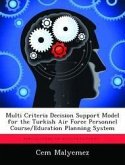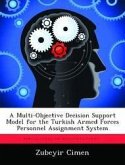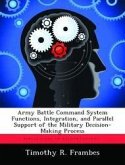This monograph seeks to define what a Decision Support System (DSS) is to the military decision-maker, suggest some evaluation criteria, and propose a sample decision-making aid. It examines the current doctrinal or academic work in that arena. The definition of a DSS, as defined by this paper, is a system that contributes to decision-making. This is a system that helps the military decision-maker use data (reports and observations) and modelling (wargaming) to solve unstructured problems (the fog of war and the environment of operations). The two major objectives of this DSS are to use time more efficiently, and to have better situational awareness. Civilian sources primarily contribute to what a DSS should be and provide some criteria to determine how to evaluate one. For the criteria which one would use to determine the effectiveness of a DSS from a military perspective, two documents come to the forefront, FM 100-5, Operations and TRADOC Pamphlet 11-9, Blueprint of the Battlefield (Draft). These are used to establish evaluation criteria that are used to measure the effectiveness of two experimental DSSs used in the monograph's cited exercises. A sample DSS is discussed. This DSS was actually used and evaluated during two exercises conducted at the School of Advanced Military studies at Fort Leavenworth. These exercise were conducted at both the tactical and operational levels of war. The experimental DSSs were used by the students during these exercises with success in that they gave the commanders and staffs better situational awareness and enabled them to use time more efficiently.Finally, a decision support matrix handbook is included as an annex. This handbook is simply a compilation of wargaming techniques and criteria from numerous sources. Although most of the rationale is seemingly tactical in nature, it constitutes the best wargaming rationale that was revealed during the research and in the cumulative, may have applicability for the operational level
Hinweis: Dieser Artikel kann nur an eine deutsche Lieferadresse ausgeliefert werden.
Hinweis: Dieser Artikel kann nur an eine deutsche Lieferadresse ausgeliefert werden.








